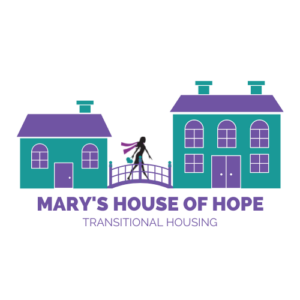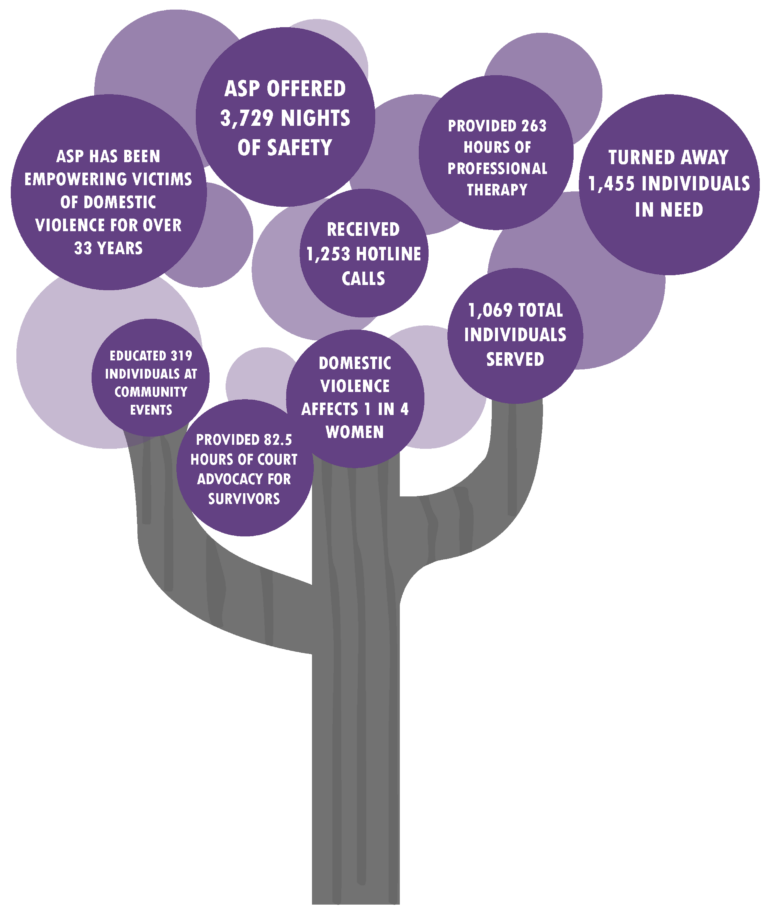Mary’s House of Hope
VIRTUAL TOUR

THE PROJECT
12 FAMILIES EMPOWERED TO TRANSITION TO INDEPENDENT LIVING
GOAL: To transition the women from the emergency shelter (A Safe Place) to independent living, free from violence and fear for one to two years at Mary’s House of Hope. $3.5 million is needed to complete the entire project.
MILESTONES:
- A groundbreaking ceremony was held on March 17, 2017
- Public water and sewer installed; site preparation is complete
- Funds raised utilizing NAP tax credits a year and a half early
- $1.5 million was raised to build and furnish the first home
- The first four families moved into apartments Fall of 2020
- The Circle of Hope campaign created to cover operational expenses
- Legacy of Hope Society Created – 2021
Viewing this website could place you in danger.
Computer use can be monitored and is impossible to completely clear searches.
Please ensure you are using a safe computer.
If you are in danger and do not have access to a safe computer, call our 24-hour crisis hotline at 636-232-2301 or call the National Domestic Violence Hotline at 1-800-799-SAFE.
If you are at a safe computer, read below for steps to stay safe.
Steps to Stay Safe
Use a safe computer at a library or community center. This is especially important when researching escape plans. Searching for bus tickets, shelter information, housing, or classified ads on a home computer can alert your abuser and increase your risk.
If you bookmark this or any other site about domestic violence, your abuser may see your computer activity. If you can, clear all web browser cache, cookies, and history. See instructions below for reducing risks.
Instructions for Internet Explorer
1. To delete temporary internet files, cookies (cryptic bookmarks that a Website can place on your computer to acknowledge your visit) and web addresses in your history:
2. On the menu at the top of the browser window, click on Tools>Internet Options…
3. In the dialog window that opens, click on the “General” tab.
4. In the section labeled “Temporary Internet Files”, if you wish to delete all files and cookies, click on the “Delete Files…” button. A confirmation dialog will open asking if you want to delete all files in your temporary internet folder. Click “OK.”
5. If you wish to selectively delete files and cookies, click on the “Settings…” button. A dialog window will open. Click on the “View Files…” button. A window will open with a list of all your temporary internet files and cookies. You can highlight the files you wish to delete and hit the delete key or click Edit>Delete.
6. To empty the History folder, click on the “Clear History” button and then the “OK” button.
If you know a friend of loved one who is being abused, consider taking these steps:
Set up a time to talk. Try to make sure you have privacy and won’t be distracted or interrupted. Let her know you’re concerned about her safety.
Be supportive. Listen to her. It may be very hard for her to talk about the abuse. Tell her that she is not alone and that people want to help.
Offer specific help. You might say you are willing to just listen, to help her with child care, or to provide transportation, for example.
Keep in mind that you can’t “rescue” your friend. She has to be the one to decide it’s time to get help. Support her no matter what her decision.
Let your friend know that you will always be there no matter what.
More Information:
Know the different warning signs of abuse.
Learn more ways to help a friend or loved one who is being abused.
Call the National Domestic Violence Hotline at 800-799-7233 or 800-787-3224 (TDD).
WHY WE EXIST
WITH YOUR DONATION, YOU CAN MAKE A DIFFERENCE FOR
THE WOMEN WHO DESERVE IT THE MOST, BUT HAVE THE LEAST
OUR IMPACT

ABOUT THE PROJECT
For many of us, our home is the safest place we know, a personal sanctuary where we can retreat and relax. For survivors of domestic violence, though, their homes are not havens. Their homes are cocoons of fear. To escape the abuse, women and men, and their children, need a comprehensive program of education, therapy and counseling, court advocacy, and above all, a secure environment.
They need A Safe Place.
Our residential program is the only emergency shelter for domestic violence in Jefferson County. Serving the greater St. Louis area and surrounding counties, A Safe Place provides services to meet the immediate needs of domestic violence survivors including physical, sexual, emotional, verbal, psychological, or the destruction of property or pets.
While staying at A Safe Place, survivors learn to break the cycle of violence through individual counseling, support groups, education, and comprehensive parenting, fitness, and wellness programs. Over time and through work with a variety of providers,residents replace their feelings of dependency with self-sufficiency. They learn to build their self-esteem, and work on assertiveness, communication and decision-making skills. They receive assistance with nutrition, budgeting, housing options, job searches, and career planning, in addition to full primary care, dental care, and mental health services. Because every resident is unique, we offer individualized plans that coordinate all services, providing the optimal opportunity for each person to be restored to wholeness.
Adults aren’t the only victims of domestic violence. Children who grow up in abusive homes frequently learn violence as an acceptable means of resolving conflict and exerting control. These children are more likely to become victims or perpetrators as adults. A Safe Place offers assistance to these youngest survivors through counseling, recreational activities, child play therapy, and art therapy. A Safe Place also offers a Pet Protection Program to ensure domestic animal safety.
A Safe Place empowers residents and their children to rise above the pain of domestic abuse and begin a new, safer and healthier life, where they can transform from victim to survivor.
Why is the project called Mary’s House of Hope?
Mary Daniels was a woman from Hillsboro killed by her estranged husband in 2010. Mary’s family, friends, and supporters have raised over $100,000 for this project.
Who will manage the facility?
Compass Health Network will own and manage the facility. Mary’s House of Hope is being constructed on property adjacent to Compass Health Network’s A Safe Place.
How much is needed to complete the entire project?
$3.5 million
How many housing units will Mary’s House of Hope at A Safe Place Provide?
Each house consists of four units (one 1-bedroom unit, two 2-bedroom units, and one 3-bedroom unit). When all three houses are completed, there will be three 1-bedroom units, six 2-bedroom units, and three 3-bedroom units (total of 12 units). In addition, there will be three multipurpose rooms. A playground is adjacent to the housing facilities.
How long will a family reside in transitional housing?
A family can remain in a unit for up to two years. Residents will receive an individualized plan of action towards sustainable living, with staff oversight on measurable progress.
How will donors be recognized?
Donor recognition levels range from $1 to over $250,000. Donors will be acknowledged on COMTREA’s virtual donor wall. Additional donor recognition is dependent on amount of gift.
What is the project timeline?
The first housing complex is completed and we are continuing the campaign to raise funds for the remaining two units.
Is my donation tax deductible?
We are a tax exempt 501(C)3 organization and contributions are deductible to the extent of the law (please consult advisor).
What is the Circle of Hope?
Our Circle of Hope program supports sustainable funding of Mary’s House of Hope. These homes will continue to give hope far into the future. As each woman moves on to her own house, empowered and able to sustain herself and her family, the unit will be refreshed for another survivor looking to secure their independence.
Many effects of the 2020 pandemic are yet to be seen. The shelter in place orders given to protect society as a whole have only increased household tensions, especially those living with a violent partner or family member.
A Safe Place emergency shelter is now expecting a second surge; a surge of victims seeking shelter from abusers they have been locked down with during the past year.
The current lack of affordable housing offered in our area brings devastating consequences for those fleeing violent living conditions. Mary’s House of Hope will be on the forefront of the expected surge as we take next steps to build a second transitional housing unit. Families currently living in the first unit will continue to work towards their own individualized plan of action towards sustainable living.
Please consider supporting Phase 2 of Mary’s House of Hope to build four additional apartments for other families ready to transition out of A Safe Place emergency shelter.
You can be part of the foundation that builds a home for so many families seeking a safe and independent future.
CIRCLE OF HOPE
PROGRAM OVERVIEW
Your gift to the Circle of Hope program supports operational costs for Mary’s House of Hope at A Safe Place. These homes will continue to give hope far into the future. As each woman moves on to her own house, empowered and able to sustain herself and her family, the unit will be refreshed for other survivors looking to secure their independence.
FUND LIVING EXPENSES
MONTHLY & ONE-TIME DONATIONS
$50 monthly
$100 monthly
$250 monthly
$500 monthly
SPONSOR A FAMILY
MONTHLY COMMITMENT
$700 monthly (1-bedroom unit)
$800 monthly (2-bedroom unit)
$1,000 monthly (3-bedroom unit)
$1,250 monthly (3-bedroom unit and living expenses)
$2,083 monthly (Two 2-bedroom units and living expenses)
BUILD HOPE FOR SURVIVORS
Mary’s House of Hope is supported by financial gifts, grants, volunteer time and services, and donations of supplies.
Donations are tax-deductible to the extent of the law.
LEGACY OF HOPE
HOW TO LEAVE AN IMPACT
Giving through your will is easy, and no amount is too small. There are many options that can be tailored to your needs.
- Leave a monetary amount in your will or trust
- Provide a gift of real estate
- Transfer stocks and business holdings
- Donate retirement assets or IRA rollover
- Gift life insurance funds
- Designate annual interest earnings
- Set up an endowment
Charitable Wishes
Your financial advisor can help legacy gifts exist side-by-side with other beneficiaries and family priorities. We’ll help you find the best fit for your gift so it creates a permanent impact.
Financial Planning
Each type of charitable gift has varying tax laws and flexibility. Every situation is different; please discuss with your financial advisor or attorney the best plan for you. COMTREA does not provide financial or legal advice.
Click here to download a fillable pdf form. Once completed, mail or email the form to:
Compass/MHOH
ATTN: Legacy of Hope
227 East Main Street
Festus, MO 63028
